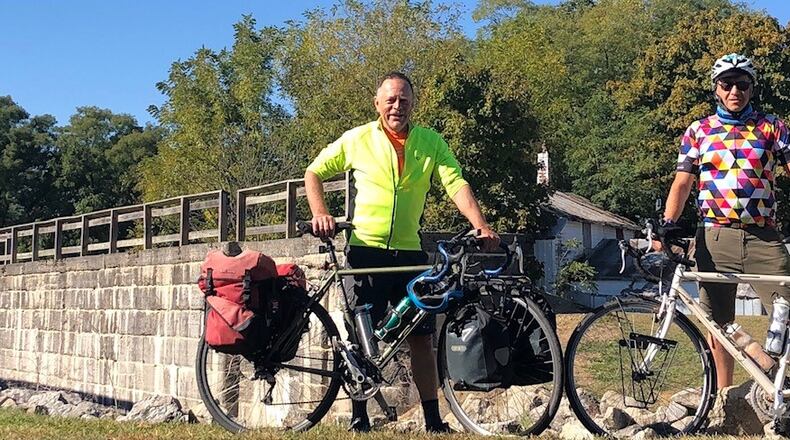The journey started Oct. 1 with Jackson and fellow rider Todd Hart, who rode about 35 miles a day on a path mapped out for maximum exposure to the area and its history. Two other riders joined them in Delphos and rode the final three days with them to Toledo.
The route was charted along the full length of the Great Miami River Trail between Hamilton and Piqua as well as shorter trails, towpath segments and, at times, country roads.
“There is no formal route for the full distance, so part of this will be a bit of discovery — determining as we go which sections of the canal towpath are ridable, and which might only be right for hiking,” Jackson said as the journey began.
As with any outdoor adventure, the riders met a few challenges including winds that arrived in the area early in their trip, thanks to Hurricane Ian.
While Jackson had planned for wind out of the west, the riders encountered winds from the hurricane from the northeast. This made wind a constant challenge during the first two days of the ride.
The men had reservations each night, so they had to reach the designated end goal each day. The plan also included site tours and museum visits, some which had to be skipped to stay on schedule.
“You have to understand the topography is different on a bike than in a car. One of the master strokes of the canal design, and the railroads which followed was inclines and declines of no more than about 2% — which does not sound so bad. However, the ride from Cincinnati to Lockington is a constant climb,” he said. “Riding all day, uphill, even at a 2% incline will wear at you as the day goes on. Combine this with a strong headwind and it can be both mentally and physically challenging.”
Despite such challenges, Jackson said seeing an area from a bicycle can be so much different than by vehicle.
“I grew up no more than 4 miles from the Miami & Erie Canal and really did not think much about it except for trips to the Johnston Farm (Piqua) every few years. The trail, particularly from Dayton to Piqua, exposes multiple locks and other parts of the canal infrastructure. On a bike, you can take your time to examine what is still there,” he said.
One of the most amazing aspects of the canal and its locks were the construction even before steam power, Jackson said. The canal trench was dug with shovels and mule power, he said, while the lock stones were cut and placed without modern machinery.
He plans to publicize information on the Miami & Erie route with hopes that others interested in the journey will have something to work with to plan their rides, Jackson said.
Contact this contributing writer at nancykburr@aol.com.
About the Author
